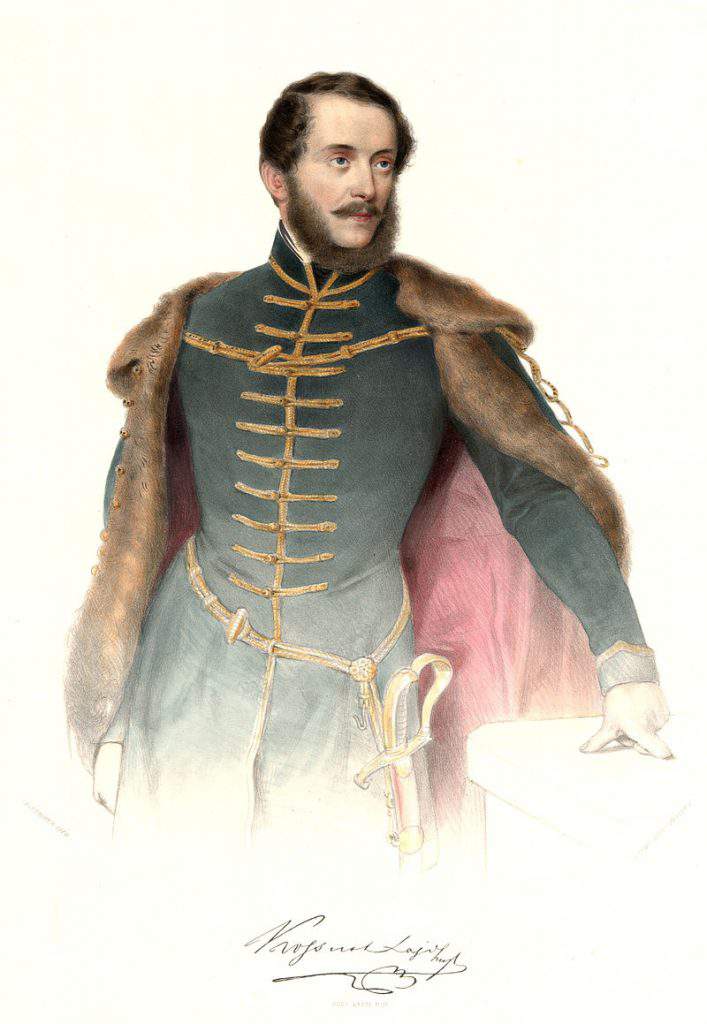Change language:
Political heroes of the Hungarian Revolution of 1848-1849

These three men are only three examples of the many great Hungarian political minds of the 19th century. It goes without saying that each and every Hungarian person who fought in the Hungarian Revolution of 1848-49 was a hero. The 15th of March will forever be a special day in Hungary.
Count Lajos Batthyány (1807-1849)

He was born into one of the wealthiest families in the country on 10 February 1807. On 17 March 1848, he became Hungary’s Prime Minister appointed by Archduke Stephen, palatine of Hungary. He was ready to take drastic measures for the Hungarian constitutionalism but only within the boundaries of the law. He was the one who organised both the Hungarian militia and army.
During the revolution, he was encouraged to leave the country but he was never willing to do that.
He was arrested on 8 January 1849; then he was court-martialled. He was sentenced to death by hanging on 30 August 1849. He found the sentence to be humiliating and made his wife, Antónia Zichy, smuggle in a dagger for him. The day before his sentence, he attempted suicide with that dagger. He stabbed himself in the neck, but he remained alive. He could not be hanged due to the injury on his neck, so he was sentenced to die by a bullet. While he was being executed, he never let the guards cover his eyes.
Even though he was a politician and not a soldier, he was just as brave as the men on the battle fields.
Lajos Kossuth (1802-1894)

Even though he was born into a poor gentry family, he managed to become one of the best-known figures of Hungarian history.
He was a lawyer, journalist, politician, statesman and Governor-President of the Kingdom of Hungary during the revolution of 1848–49.
In January 1841, he was the appointed editor of Pesti Hírlap, a new Liberal party newspaper. The government paid little attention to the Liberal party newspaper and considered it to be weak and powerless. However, Pesti Hírlap achieved unprecedented success. The paper managed to have more subscribers than any Hungarian paper before.
Lajos Kossuth then and there, laid the foundations for our modern Hungarian political journalism.
On 17 March 1848 Count Lajos Batthyány created the first Hungarian responsible government and became the Prime Minister. Lajos Kossuth was appointed as the Minister of Finance. He immediately began developing the internal resources of the country, he re-established a separate Hungarian coinage, and used every means to increase the Hungarian national self-consciousness. Towards the end of the revolution, Kossuth was appointed regent-president. When all hope seemed to be lost by the intervention of Russia, Kossuth abdicated in favour of Görgey who capitulated at Világos to the Russians, who handed over the Hungarian army to the Austrians. Kossuth left Hungary and died in Torino in 1894.
Count István Széchenyi (1791-1860)

Count István Széchenyi was born into the influential, noble and wealthy Széchenyi family on 21 September 1791. Széchenyi travelled extensively in Europe, visiting the leading countries of the continent such as France, England and Italy, and he studied their institutions. He established important personal connections.
Széchenyi became aware of the growing gap between the modern world and Hungary.
For the rest of his life, he was a determined reformer who promoted development in Hungary.
In 1825, Széchenyi donated his full annual income, 60,000 florins to establish the Hungarian Academy of Sciences.
He also organised the Nemzeti Kaszinó [National Casino]. He concentrated on the development of transportation infrastructure, as he understood its importance for development and communication. During the revolution, he was appointed Minister of Public Works and Transport.
He supported the regulation of the Danube to improve navigation and to open it to commercial shipping and trade from Buda to the Black Sea. The river had been dangerous for ships and was not efficient as an international trading route. Széchenyi was the first to promote steamboats on the Danube. He was thinking about the merge of Buda and Pest to become the political, economic and cultural centre of Hungary. He supported the construction of the first permanent bridge between the two cities: the Chain Bridge. He had an a long-lasting battle with depression, and he committed on 8 April 1860.
Source: www.marcius15.kormany.hu; Daily News Hungary








cools